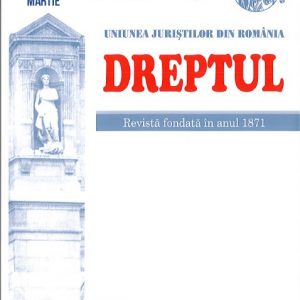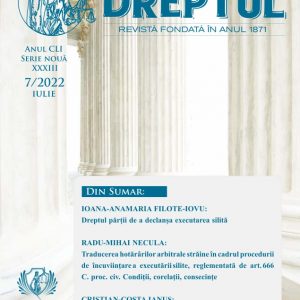-
 The features that give a distinct note to European Union law, and even its specificity, in relation to national or international legal orders, whether universal or regional, par excellence lie in the immediate, direct and priority applicability of the rules that make it up. The concept of „priority” EU law in relation to the national law of the Member States is likely to complete the understanding of its specificity in relation to the situation which we encounter with reference to international law. The development and adoption of primary or secondary norms of European Union law represent true, intrinsic consequences of developments or, respectively, expectations recorded at EU level, either qualitatively or quantitatively. From such a perspective the steps we are witnessing, including those of legislative nature, must be known, understood, and accepted. Our approach considers the fundamental legal basis offered by the Romanian Constitution, republished version, but also relevant aspects found in the Civil Code, the Civil Procedure Code, Penal Code, and Criminal Procedure Code, to which we add the Insolvency Law.
The features that give a distinct note to European Union law, and even its specificity, in relation to national or international legal orders, whether universal or regional, par excellence lie in the immediate, direct and priority applicability of the rules that make it up. The concept of „priority” EU law in relation to the national law of the Member States is likely to complete the understanding of its specificity in relation to the situation which we encounter with reference to international law. The development and adoption of primary or secondary norms of European Union law represent true, intrinsic consequences of developments or, respectively, expectations recorded at EU level, either qualitatively or quantitatively. From such a perspective the steps we are witnessing, including those of legislative nature, must be known, understood, and accepted. Our approach considers the fundamental legal basis offered by the Romanian Constitution, republished version, but also relevant aspects found in the Civil Code, the Civil Procedure Code, Penal Code, and Criminal Procedure Code, to which we add the Insolvency Law. -
 The courts can contribute, within their competencies, to ensure supremacy of the Constitution; this also involves the ability to directly implement some of the constitutional regulations. In the context of the complex process of human rights internationalization, certain analysis and solutions concerning the relationship between the international and domestic human rights regulations and hence interpretations of the provisions covered by the Constitution on this issue appear more frequently within the case law. In this study the author analyzes the role of national judges in applying the (European) Convention for the Protection of Human Rights and Fundamental Freedoms under the legitimacy which is conferred upon them by the provisions of Art. 20 of the Constitution, republished; this analysis is based on case law matters on criminal appeal, governed by Art. 141 paragraph 1 of the Code of Criminal Procedure.
The courts can contribute, within their competencies, to ensure supremacy of the Constitution; this also involves the ability to directly implement some of the constitutional regulations. In the context of the complex process of human rights internationalization, certain analysis and solutions concerning the relationship between the international and domestic human rights regulations and hence interpretations of the provisions covered by the Constitution on this issue appear more frequently within the case law. In this study the author analyzes the role of national judges in applying the (European) Convention for the Protection of Human Rights and Fundamental Freedoms under the legitimacy which is conferred upon them by the provisions of Art. 20 of the Constitution, republished; this analysis is based on case law matters on criminal appeal, governed by Art. 141 paragraph 1 of the Code of Criminal Procedure. -
 Având în vedere că reclamanții au solicitat desființarea unor acte de reconstituire a dreptului de proprietate privată pe calea acțiunii prevăzute de art. III din Legea nr. 169/1997, Curtea a constatat că, în lipsa unor norme de stabilire a instanței competente în cuprinsul acestei legi speciale, se va aplica Codul de procedură civilă. Dat fiind obiectul cererii (constatarea nulității absolute parțiale a unui titlu de proprietate emis în temeiul Legii fondului funciar nr. 18/1991), Curtea a constatat că, sub aspectul determinării instanței competente, se aplică criteriul valoric, astfel că prezentul conflict urmează a fi soluționat în raport de pragul legal de 200.000 lei, prevăzut la art. 94 pct. 1 lit. k) C.pr.civ. Determinarea instanței competente material în cazul cererilor imobiliare se face doar prin raportare la dispozițiile art. 104 C.pr.civ., nu și la prevederile art. 31 alin. (2) din Ordonanța de urgență a Guvernului nr. 80/2013, întrucât acestea din urmă nu instituie reguli speciale de competență, ci cuprind norme de stabilire a cuantumului taxei judiciare de timbru.
Având în vedere că reclamanții au solicitat desființarea unor acte de reconstituire a dreptului de proprietate privată pe calea acțiunii prevăzute de art. III din Legea nr. 169/1997, Curtea a constatat că, în lipsa unor norme de stabilire a instanței competente în cuprinsul acestei legi speciale, se va aplica Codul de procedură civilă. Dat fiind obiectul cererii (constatarea nulității absolute parțiale a unui titlu de proprietate emis în temeiul Legii fondului funciar nr. 18/1991), Curtea a constatat că, sub aspectul determinării instanței competente, se aplică criteriul valoric, astfel că prezentul conflict urmează a fi soluționat în raport de pragul legal de 200.000 lei, prevăzut la art. 94 pct. 1 lit. k) C.pr.civ. Determinarea instanței competente material în cazul cererilor imobiliare se face doar prin raportare la dispozițiile art. 104 C.pr.civ., nu și la prevederile art. 31 alin. (2) din Ordonanța de urgență a Guvernului nr. 80/2013, întrucât acestea din urmă nu instituie reguli speciale de competență, ci cuprind norme de stabilire a cuantumului taxei judiciare de timbru. -
 The study is grounded on the thesis according to which the contestation against execution aimed at reducing the punishment imposed on the convicted person under the special cause of reducing the punishment provided in Article 19 of the Law No 682/2002 on the protection of witnesses is inadmissible.
The study is grounded on the thesis according to which the contestation against execution aimed at reducing the punishment imposed on the convicted person under the special cause of reducing the punishment provided in Article 19 of the Law No 682/2002 on the protection of witnesses is inadmissible. -
 The interpretation and the application of the provisions of Article 31 (3) and Article 60 of the Labour Code have led to the existence of a non-unitary judicial practice and to the expression of some divergent positions in the doctrine as regards the applicability of the temporary prohibitions on dismissal in case of termination of the individual labour contract at the initiative of the employer, during or at the end of the period of probation. In a first doctrinal and jurisprudential orientation it is argued that Article 60 of the Labour Code is not applicable, because we are not in the presence of a dismissal, but of a separate case of termination of the individual labour contract at the initiative of the employer. The second opinion argues the thesis according to which the termination of the individual labour contract at the initiative of the employer during or at the end of the period of probation is also a case of dismissal, the legislative derogations aiming only at simplifying the dismissal procedure during the period of probation, and not at removing the temporary prohibitions on dismissal provided by Article 60 of the Labour Code.
The interpretation and the application of the provisions of Article 31 (3) and Article 60 of the Labour Code have led to the existence of a non-unitary judicial practice and to the expression of some divergent positions in the doctrine as regards the applicability of the temporary prohibitions on dismissal in case of termination of the individual labour contract at the initiative of the employer, during or at the end of the period of probation. In a first doctrinal and jurisprudential orientation it is argued that Article 60 of the Labour Code is not applicable, because we are not in the presence of a dismissal, but of a separate case of termination of the individual labour contract at the initiative of the employer. The second opinion argues the thesis according to which the termination of the individual labour contract at the initiative of the employer during or at the end of the period of probation is also a case of dismissal, the legislative derogations aiming only at simplifying the dismissal procedure during the period of probation, and not at removing the temporary prohibitions on dismissal provided by Article 60 of the Labour Code. -

-
 Unlike the previous Civil Procedure Code, the current (Romanian) Civil Procedure Code regulates (as an exception from the rule of uniqueness of the judicial remedies of a judgment) the admissibility, in some situations, of filing an appeal ex novo during the judgment of an appeal ex novo, respectively, of filing the appeal on law during the judgment of an appeal on law. This study examines analytically this new conception and regulation of the current Civil Procedure Code (Law No 134/2009, republished), the author positively appreciating the new regulation in question.
Unlike the previous Civil Procedure Code, the current (Romanian) Civil Procedure Code regulates (as an exception from the rule of uniqueness of the judicial remedies of a judgment) the admissibility, in some situations, of filing an appeal ex novo during the judgment of an appeal ex novo, respectively, of filing the appeal on law during the judgment of an appeal on law. This study examines analytically this new conception and regulation of the current Civil Procedure Code (Law No 134/2009, republished), the author positively appreciating the new regulation in question. -
 The insurance market in Romania is an extremely complex field of legal regulation, which involves not only the observance of the principle of fair competition between the professional competitors, rivals on the market, but mostly the observance of some high standards of consumers’ protection, which are in a net inferiority ratio from a financial, informational and organizational point of view, in comparison with the policy issuers covering the compulsory civil insurance. From this perspective, the withdrawal of the operating authorization and the initiation of the bankruptcy procedure against the Insurance-Reinsurance Company City Insurance – S.A. raises a series of big problems for the clients of this insurer, not only from the point of view of the contractual relations established by the insurance contract, but especially through the procedural mode of action on the part of these consumers, so that the protection of their rights be full, as well as that the effects of the opening of bankruptcy procedure against City Insurance be mitigated, as much as possible, in relation to the already precarious situation of these clients. We intend, through this study, to highlight a series of pressing legal issues and to propose a series of solutions to the legal, substantive or procedural issues that arise from the withdrawal of the authorization of this important player on the insurance market from Romania. Thus, those entitled to recover the expenses occasioned by the repair of the cars involved in road accidents caused by the clients of City Insurance – S.A. have the way opened for a special and accelerated procedure for the recovery of these damages, without waiting for the opening of the bankruptcy procedure against this insurer and the registration in the amount of claims, extremely laborious and time-consuming legal procedures, which raise problems for the consumers who are victims of traffic accidents, and also for the clients of the insurance company who could see themselves engaged in legal actions intended to lead to the compensation of those injured in road accidents and that would endanger their personal patrimony, although they appear as contracting parties and beneficiaries of some perfectly valid RCA policies on the date when the damage was caused.
The insurance market in Romania is an extremely complex field of legal regulation, which involves not only the observance of the principle of fair competition between the professional competitors, rivals on the market, but mostly the observance of some high standards of consumers’ protection, which are in a net inferiority ratio from a financial, informational and organizational point of view, in comparison with the policy issuers covering the compulsory civil insurance. From this perspective, the withdrawal of the operating authorization and the initiation of the bankruptcy procedure against the Insurance-Reinsurance Company City Insurance – S.A. raises a series of big problems for the clients of this insurer, not only from the point of view of the contractual relations established by the insurance contract, but especially through the procedural mode of action on the part of these consumers, so that the protection of their rights be full, as well as that the effects of the opening of bankruptcy procedure against City Insurance be mitigated, as much as possible, in relation to the already precarious situation of these clients. We intend, through this study, to highlight a series of pressing legal issues and to propose a series of solutions to the legal, substantive or procedural issues that arise from the withdrawal of the authorization of this important player on the insurance market from Romania. Thus, those entitled to recover the expenses occasioned by the repair of the cars involved in road accidents caused by the clients of City Insurance – S.A. have the way opened for a special and accelerated procedure for the recovery of these damages, without waiting for the opening of the bankruptcy procedure against this insurer and the registration in the amount of claims, extremely laborious and time-consuming legal procedures, which raise problems for the consumers who are victims of traffic accidents, and also for the clients of the insurance company who could see themselves engaged in legal actions intended to lead to the compensation of those injured in road accidents and that would endanger their personal patrimony, although they appear as contracting parties and beneficiaries of some perfectly valid RCA policies on the date when the damage was caused. -

-
 Decree No 40/1953 marked the transfer of the competence to settle the non-contentious succession procedure from the courts to the former State Notaries. This competence was also maintained by the new regulation of the activity of notaries public, the Law No 36/1995. However, neither the aforementioned Decree or the Law No 36/1995 in its original version acknowledged the possibility for interested persons to resolve amicably those disputes resulting from the issuance of the certificate of succession without complying with certain legal provisions that could lead to its annulment. Starting with 2013, the litigants benefit from a new legal way of declaring the nullity of the certificate of succession, the present study proposing its analysis and also the comparison with the other procedure already established for annulling the certificate of succession, the judicial procedure. The two procedures led to lengthy debates in practice, given the double controversy over the legal nature of the certificate of succession and the legal regime of conventional nullities, the legislator of the new Civil Code indicating only the possibility of declaring a nullity through conventional means, letting the doctrine define its effects. We have chosen as the focal point of this research treating these controversies born in the judicial and notarial practice, both encountering some difficulties, for example, in qualifying the type of nullity invoked according to the interest protected by the violated legal norm or establishing who can file an action for the annullment of the certificate of succession. These issues determined us to try to answer the questions that have risen in the judicial and notarial practice regarding the succession procedure and the annulment of the certificate of succession, trying through this research to offer them the most suitable answers, taking into account especially the spirit of the law, without neglecting its letter. Thus, we mainly analyzed who can file an action for the annulment of the certificate of succession, the issue of the extinctive prescription of this action, as well as the regime of the amicable nullity applicable when the heirs agree on declaring the nullity of the certificate of succession.
Decree No 40/1953 marked the transfer of the competence to settle the non-contentious succession procedure from the courts to the former State Notaries. This competence was also maintained by the new regulation of the activity of notaries public, the Law No 36/1995. However, neither the aforementioned Decree or the Law No 36/1995 in its original version acknowledged the possibility for interested persons to resolve amicably those disputes resulting from the issuance of the certificate of succession without complying with certain legal provisions that could lead to its annulment. Starting with 2013, the litigants benefit from a new legal way of declaring the nullity of the certificate of succession, the present study proposing its analysis and also the comparison with the other procedure already established for annulling the certificate of succession, the judicial procedure. The two procedures led to lengthy debates in practice, given the double controversy over the legal nature of the certificate of succession and the legal regime of conventional nullities, the legislator of the new Civil Code indicating only the possibility of declaring a nullity through conventional means, letting the doctrine define its effects. We have chosen as the focal point of this research treating these controversies born in the judicial and notarial practice, both encountering some difficulties, for example, in qualifying the type of nullity invoked according to the interest protected by the violated legal norm or establishing who can file an action for the annullment of the certificate of succession. These issues determined us to try to answer the questions that have risen in the judicial and notarial practice regarding the succession procedure and the annulment of the certificate of succession, trying through this research to offer them the most suitable answers, taking into account especially the spirit of the law, without neglecting its letter. Thus, we mainly analyzed who can file an action for the annulment of the certificate of succession, the issue of the extinctive prescription of this action, as well as the regime of the amicable nullity applicable when the heirs agree on declaring the nullity of the certificate of succession. -

-
 The present paper aims to analyze extensively the institution of commitment of the responsibility of the Government before the Parliament, trying to identify possibilities to improve the current constitutional regulation in Romania. For this purpose, in a first part of the paper, in order to better understand the resources of the institution, the comparative method is used. Thus, similar regulations from other states are widely presented, such as the vote of confidence in a number of parliamentary regimes (United Kingdom of Great Britain and Northern Ireland, the Federal Republic of Germany, the Fourth French Republic), as well as the regulation of the commitment of the responsibility of the Government in the current French semi-presidential regime. Subsequently, the paper focuses on the regulation of the institution of commitment of the responsibility in Romania, being studied the manner of application thereof by the Government in the last 30 years. Several perspectives are used for this purpose: that of doctrine, an occasion that allows the presentation of arguments for and against the current regulation of the institution; that of constitutional practice, which allows the understanding of some disfunctionalities of the current regulation; and, finally, that of the constitutional case law developed in the last three decades, on which occasion it can be deduced a complex theory developed by the constitutional court regarding the limits of the use of the institution. At the end of the paper, a series of proposed amendments are analyzed on the occasion of various attempts to revise the Romanian Constitution and an extensive set of proposals on improving the current regulation is presented. As a consequence, the present paper provides a starting point for the future use of the institution of commitment of the responsibility of the Government, but especially for the improvement of the current constitutional regulation.
The present paper aims to analyze extensively the institution of commitment of the responsibility of the Government before the Parliament, trying to identify possibilities to improve the current constitutional regulation in Romania. For this purpose, in a first part of the paper, in order to better understand the resources of the institution, the comparative method is used. Thus, similar regulations from other states are widely presented, such as the vote of confidence in a number of parliamentary regimes (United Kingdom of Great Britain and Northern Ireland, the Federal Republic of Germany, the Fourth French Republic), as well as the regulation of the commitment of the responsibility of the Government in the current French semi-presidential regime. Subsequently, the paper focuses on the regulation of the institution of commitment of the responsibility in Romania, being studied the manner of application thereof by the Government in the last 30 years. Several perspectives are used for this purpose: that of doctrine, an occasion that allows the presentation of arguments for and against the current regulation of the institution; that of constitutional practice, which allows the understanding of some disfunctionalities of the current regulation; and, finally, that of the constitutional case law developed in the last three decades, on which occasion it can be deduced a complex theory developed by the constitutional court regarding the limits of the use of the institution. At the end of the paper, a series of proposed amendments are analyzed on the occasion of various attempts to revise the Romanian Constitution and an extensive set of proposals on improving the current regulation is presented. As a consequence, the present paper provides a starting point for the future use of the institution of commitment of the responsibility of the Government, but especially for the improvement of the current constitutional regulation.
